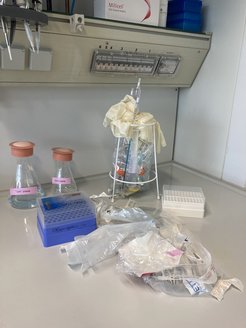Good science is sustainable science
The Max Planck Gesellschaft must do its part
By: Allison Lewis, editor and blogger

Scientists have a secret: publicly we are ringing the alarm bell of the global climate emergency while also failing to address the fact that our experiments remain dependent on energy intensive equipment and single-use plastics. Researchers have little choice other than to be complicit, as these destructive habits have unfortunately become standard practice when conducting modern experiments. Compounding this challenge, leadership at scientific institutes and funding agencies have failed to encourage and enforce the use of sustainable alternatives in response to climate change. This lack of support at the institutional level can and has led to concerned scientists feeling helpless, similar to individuals in civil society lacking support from their community and hindering the advancement of sustainable practices. As students in the Max Planck Gesellschaft (MPG) we should consider how we can be advocates for change in our scientific community - much like you can promote change in your local community. For now, the responsibility to make science more sustainable seems to be falling on the shoulders of MPG scientists, who have banded together across institutes to create the Sustainability Network. In 2015 a group of scientists at the Max Planck Institute in Magdeburg began a grassroots movement to make their science more sustainable, and in over 5 years the network has grown to include over 300 scientists from 50+ institutes. Initiatives are wide-ranging; some can be as simple as choosing to order refillable pipette tip boxes instead of pre-packed and using glass vials and pipettes rather than plastic. Other strategies require fundamental changes to the architecture of the building- such as the use of photovoltaics on the roof at the MPI in Martinsried (and hopefully soon at Heidelberg). Foundational changes such as these set a precedent for what can be achieved across institutes and should become the new “standard practice” in the years to come.
These initiatives are as inspiring as they are necessary, but the acts of individual scientists unfortunately only represent a rather small fraction of the equation to achieve sustainability in research. As a publicly funded enterprise the MPG has a responsibility to society and its scientists to promote and implement sustainable practices at its institutes. Yet the current president of the Max Planck Gesellschaft has expressed concern that the implementation of sustainable practices in research “restricts the freedom of science”, which may explain why the MPG has not been a leader on this issue. Furthermore, their absence from the federally funded LeNa sustainability project, which counts the Frauenhofer, Lebnitz and Helmholtz institutes among its ranks, does not inspire hope that the approach to sustainability, or rather lack-thereof, will meaningfully change. The MPGs silence in the sustainability conversation and absence from environmental initiatives weakens the impact and importantly is at odds with the current morale of science and society.
Fortunately, the MPG seems to be tipping its toes into the discourse by establishing the “Commission for Climate Protection'' which will hopefully bring them in line with their peers. The support and resources of the general administration will empower scientists of the MPG to choose sustainable alternatives when they conduct their research by eliminating bureaucratic and logistic barriers. For example, at my institute, current supply contracts favour the ART single-use pipette boxes which must travel all the way from the United States, rather than refillable tip racks from Eppendorf, here in Germany (not to mention the Eppendorf tips also have less plastic per tip than those currently in use!) To make use of these more sustainable alternatives individual labs must make a conscious effort to order their own supplies rather than using those provided centrally. Nothing is perhaps more emblematic of this disconnect between the desires of scientists and the decisions of the general administration than the inconsistent handling of waste. Some institutes take the initiative to sort recyclable waste while others discard all waste to the landfill. This highlights the need for better communication throughout the MPG to establish common goals in our approach to sustainability. In an ideal world, the issue of sustainability in science would be treated with the same urgency and seriousness as lab safety, and every institute would have a dedicated sustainability officer. The consequences of failing to work more sustainably may not be felt as acutely as issues of safety, but the effects will be felt in the long term and the environment, and consequently future generations, will bear the burden of our inaction. Importantly, it is more practical and efficient for the MPG to initiate a collaborative approach in adopting sustainable practices, as this would eliminate redundancies in implementation between institutes. Once an approach is successful at one institute, for example the photo-voltaics at the MPI in Martinsried, there is no need to reinvent the wheel. Furthermore, the MPG could learn from their peers at the Helmholtz, Frauenhofer, and Leibnitz institutes to improve their vision and implementation of sustainable practices in science. A collaborative approach which bridges the scales between individual scientists, Max Plank institutes, and the MPG general administration will allow us to achieve sustainable solutions which are greater than the sum of the parts. This collaborative support network would empower scientists of the MPG to make forward thinking choices when they conduct their research and know that they are not working alone but are a part of a larger group committed to understanding and preserving the planet. There are over 25,000 employees working in the MPG; imagine what we can accomplish together.
